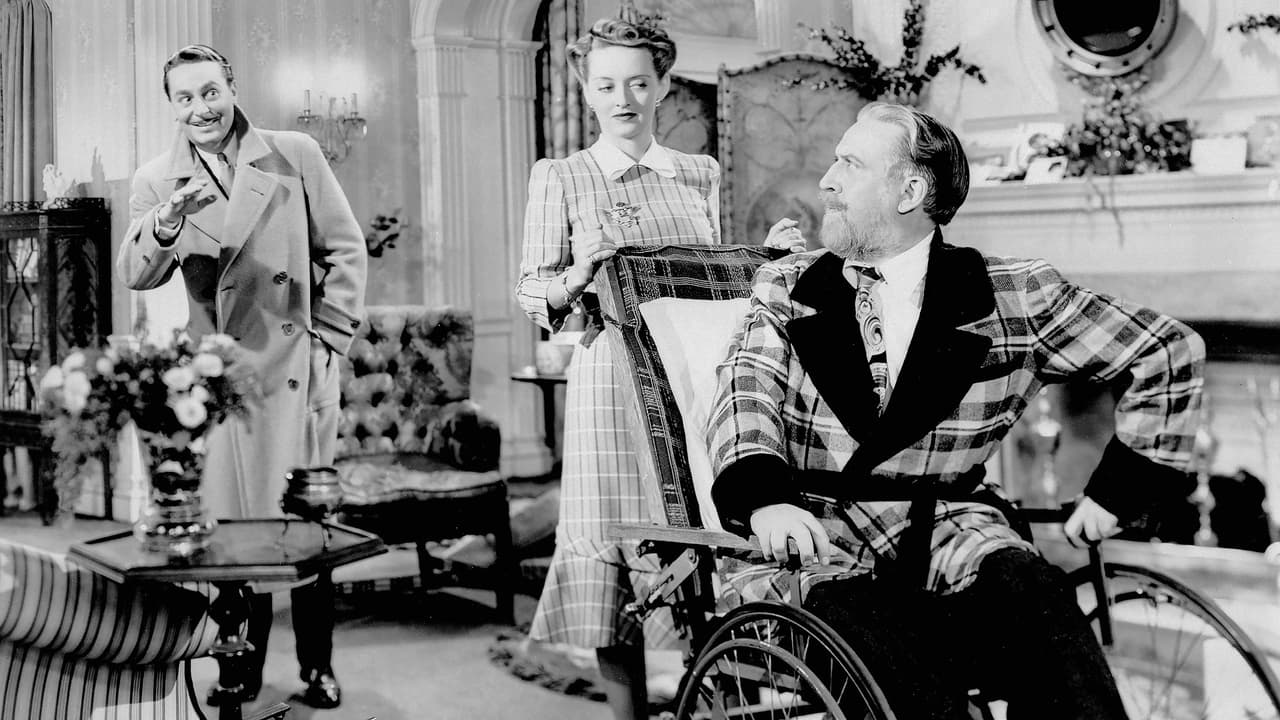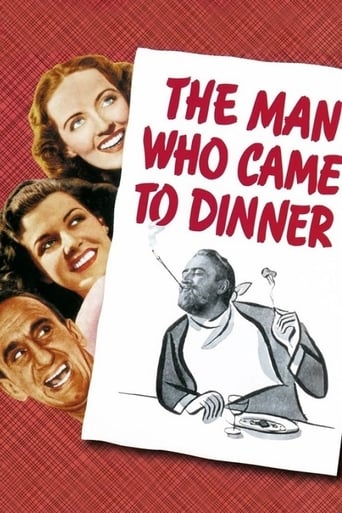

SERIOUSLY. This is what the crap Hollywood still puts out?
... View Moren my opinion it was a great movie with some interesting elements, even though having some plot holes and the ending probably was just too messy and crammed together, but still fun to watch and not your casual movie that is similar to all other ones.
... View MoreThe first must-see film of the year.
... View MoreI didn’t really have many expectations going into the movie (good or bad), but I actually really enjoyed it. I really liked the characters and the banter between them.
... View MoreThis film is worth watching for the very sharp and witty dialogue. It is still very funny and entertaining. Some of the best lines are towards the end, like Jimmy Durante hoisting up shocked nurse Mary Wickes in his arms and saying, "Meet me in my room in a half an hour with a loaf of rye bread!" Bette Davis does a decent job with a role that doesn't suit her very well, and she seems a bit melancholy, perhaps because the script requires her to play a cruel trick on an unsuspecting person. It doesn't seem like something her character would do, and the playwrights should have found another way to make the plot device happen. But don't let that spoil the fun, this is a light-hearted romp and should be enjoyed as such. Monty Woolley is perfect as Sheridan Whiteside, roaring like a lion and enjoying himself immensely in the role.
... View MoreI will admit that I was disappointed with "The Man Who Came to Dinner". I was expecting the humour to be a little dated, with lots of the hammy delivery, 'double-takes', and 'slow burns' that were a staple of comedies of that era, but I was also expecting the witty and sparkling dialogue that characterises the best of the genre (1934's "The Thin Man" being a good example). While Sheridan Whiteside (Monty Woolley) had lots of acerbic one-liners, most of the other characters simply served as targets, so there was not much of the 'give and take' repartee that can really liven up this kind of stagy story. Not surprisingly, Jimmy Durante 'over-the-topped' his manic 'Banjo' role while, on the other hand, Bette Davis was moderately restrained, playing a role than any Hollywood ingénue could have handled. The rest of the ensemble cast was fine, especially Anne Sheridan as a sultry parvenu from Kansas, character actress Mary Wickes as Nurse Preen, and Reginald Gardiner as Beverly Carlton (whose 'upper class twit of the year' impression was a highlight (IMO)). The broad-comedy bits (e.g. the arrival of penguins, octopi, etc. at the Stanley's besieged home) just seemed contrived and ridiculous and did a lot to lower my overall opinion of the film. All in all, I was underwhelmed but comedy is a very personal taste, so take my comments as opinion, not recommendation. Note: the script name-drops a 1940's 'who's who', so some viewers may want access to Google while watching (Zazu Pitts or Walt Winchell jokes being bit obscure these days), but I doubt that I'd want to watch an updated remake (on stage or film) – a phone call from Eleanor Roosevelt seems inherently funnier than a phone call from Melania Trump.
... View MoreNo need to recap the plot.For contemporary audiences the 2-hours is likely a matter of taste. For sure, the literary script is totally unlike today's raw comedic antics. The curmudgeonly Whiteside (Wooley) manages to insult just about everyone, but in highly elevated fashion. At times, his jibes are a little much and you want to conk him, but somehow the actor avoids making the snobbish character dislikable. All in all, it's a pretty good thespic feat. The movie's a filmed stage play, which means the director has to keep our eye entertained, which he does by shuffling characters in and out, resulting at times in a kind of madcap. Despite the large cast, and the presence of marquee names like Davis and Sheridan, everything revolves around Wooley's Whiteside. Then too, I suspect other reviewers are correct —Durante's low-brow humor was included as relief from that general flow of sophistication. I'm not surprised the play was a hit in New York City. However, it was apparently a big hit nationally, meaning less cosmopolitan audiences also responded. That, I think, is a tribute to not just Wooley, but the production as a whole. Still, the movie dates itself with passing references to celebrities of the day. And note, in passing, how common man Banjo (Durante) refers to the (Brooklyn) Dodgers, which soon became a movie staple for the common WWII war effortAnyway, for folks wanting a strong contrast to the gutter-language comedy of today, this is a film to catch.
... View More"Form follows function" is not just a principle that applies to architecture but something that makes everything legitimate and well-designed. The shape or tone of something should be mainly anchored in its idea or meaning, for the most part, right? Well, The Man Who Came to Dinner is an account of one of surely countless similar episodes in the life of the biggest douchebag in the history of cinema, actually probably in the history of all vaginal cleaning agents. Whatever they were using before douche, he still outranks it. That's fine. If you have a character you fully develop, give presence and make a movie about, I'm there! Many of my favorite films center around less than sympathetic characters, but none of them work via the presumption that I must like him. This remarkably snooty romp seeks to lionize a character so vain and contemptible, and spend all of its energies on surefire formulas for farce, so that we don't stop to think about anything the script doesn't want us to.Everything accelerates with one contrivance after another, what with a boys' choir, an Egyptian mummy, a flock of penguins. The cast relishes the incisive, brightly sneering dialogue with delight, but it's only Bette Davis, in the sole straight part, who manages to overcome the common air of laugh-begging despair. The movie grovels for laughs while striving for the wittiest way to say any and everything that's said. And Davis and the rest of the cast don't serve the story so much as anchor it in our associations with the familiar faces and names, as well as graceful comportment and transatlantic accents. The film strains itself over impeccable form to compensate for its flimsy, snooty, cloying function.The pacing is not as rhythmic as it would like to think it is. This whole movie likes to think, and would especially like us to think, that it's a quick-witted, razor-sharp farce in the classic Hawksian or Capra-esquire sense. It doesn't really want us to care about elements and characters it's just placed to add bulk around what it has truly designed for us to care about, which is Bette Davis' love interest and how her controlling boss prevents her marriage to the Ohio newspaperman. Nearly every other character, no matter how significant the conflict is that they're presented with, is forcibly marginalized for the remainder only to be resolved in a hurry at the end. But it's OK because we're effectively engaged in the quandary between Davis and her giant douche of a boss. The trick is that we're not supposed to think about much outside of that.My earliest ventures in thinking about movies, not just watching them, not just putting them on and looking at them, showed me that thinking has much to do with keeping experiences alive long enough to take something away from them, making them valuable ones. Thinking may bring to light distressing realities or produce dead ends, but its real purpose is to strengthen an idea, to increase our connection to a subject by strengthening its value in our minds. In this way, thinking gives life some character and linkage, a narrative characteristic, as if our ideas, prompted by unembarrassed interest, were running through our minds like movies! A light-hearted movie is one thing, but a movie that disregards the expectation that its audience would like to actually sink its teeth into it is another.
... View More